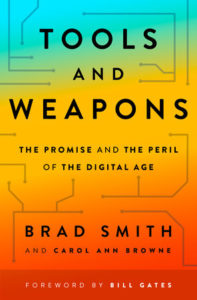 Information technology is changing the face of war and peace, creating a new theater of warfare in cyberspace and new threats to democracy through state‑sponsored attacks and disinformation, according to Brad Smith, President of Microsoft, and Carol Ann Browne, Microsoft’s senior director of communications and external relations.
Information technology is changing the face of war and peace, creating a new theater of warfare in cyberspace and new threats to democracy through state‑sponsored attacks and disinformation, according to Brad Smith, President of Microsoft, and Carol Ann Browne, Microsoft’s senior director of communications and external relations.
In the democracies of the world, one of the most cherished values is that the public determines its course by electing the people who make the laws that govern everyone, they write for The Atlantic. Tech leaders may be chosen by boards of directors selected by shareholders, but they are not chosen by the public. Democratic countries should not cede the future to leaders the public did not elect, they write in a piece excerpted from their upcoming book, Tools and Weapons: The Promise and the Peril of the Digital Age.
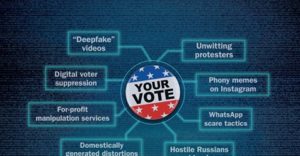 There’s more to fear than just the Russians, says the author of a new report (right) on disinformation. The Russians won’t be alone in spreading disinformation in 2020, says Deputy Director of New York University’s Stern Center for Business and Human Rights, Their most likely imitator will be Iran, especially if hostility between Tehran and Washington continues to mount, he writes for The Conversation.
There’s more to fear than just the Russians, says the author of a new report (right) on disinformation. The Russians won’t be alone in spreading disinformation in 2020, says Deputy Director of New York University’s Stern Center for Business and Human Rights, Their most likely imitator will be Iran, especially if hostility between Tehran and Washington continues to mount, he writes for The Conversation.
In the Middle East social media campaigns are being coordinated across borders in an effort to bolster authoritarian rule and douse the kind of popular protests that gave rise to the Arab Spring in 2011, The New York Times reports:
The secretive Egyptian effort to support Sudan’s military on social media this summer by the company in Cairo, New Waves, was just one part of a much bigger operation that spanned the Middle East and targeted people in at least nine Middle Eastern and North African countries, according to Facebook….The New Waves operation had echoes of the Egyptian state’s approach to controlling online debate. Under Mr. el-Sisi, Egypt has blocked over 500 websites and introduced laws that criminalize criticism of the government on social media, which Mr. el-Sisi has described as a threat to national security.
 “There have been so many fake accounts,” said Mohamed Suliman, a Boston-based engineer allied with Sudan’s protest movement. “Fake news is a real source of danger for Sudan. If there is ever a counterrevolution, one of the regime’s main tools will be social media.”
“There have been so many fake accounts,” said Mohamed Suliman, a Boston-based engineer allied with Sudan’s protest movement. “Fake news is a real source of danger for Sudan. If there is ever a counterrevolution, one of the regime’s main tools will be social media.”
Will today’s democracy survive the onslaught of technology-delivered malice? analyst Brook Manville asks in Forbes.
Yes, maybe: but only if we stop blaming bits and bytes, forget about “global democracy,” and instead tackle the structural deficits of our current representative systems of national self-governance, argues Dr. Roslyn Fuller, a Canadian-Irish academic lawyer and author of the new In Defence of Democracy. This lively polemic asserts that the problem for western civic societies is not so much defending against hostile and abusive use of technology. Instead, it’s failing to use technology to rediscover what democracy should be for the modern nation state. The book prompts five further insights, he adds:
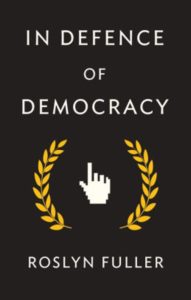 1. Technology for large-scale, direct democracy is less about elections and more about empowering policy debate and decision-making en masse. Fuller acknowledges the problems of hacked balloting and cyber-meddling—but no election reform will solve the bigger problem of disconnected citizens working through proxies…
1. Technology for large-scale, direct democracy is less about elections and more about empowering policy debate and decision-making en masse. Fuller acknowledges the problems of hacked balloting and cyber-meddling—but no election reform will solve the bigger problem of disconnected citizens working through proxies…
2. Our corrosive political media thrives because virtual conversations are untethered from policy consequences. “Yes of course,” Fuller acknowledged, “we need safeguards against cyber-bullying and moneyed and foreign influence shaping opinion. But Facebook diatribes, Twitter wars, and cable shout-fests keep growing because people can’t turn their own strongly held opinions into action. Give citizens a real say in policy-making, and the cyber negativity will decline.”
3. Reforming democracy with technology-scaled participation requires practical citizen education. Everyone agrees that improving our political system calls for better “civic knowledge” across the population. But that can’t just be more high-school courses on “how a bill becomes a law.” ….
4. Mass engagement could rebuild fractured communities. Fuller also argues for second-order effects of mass engagement. If millions of citizens participate in political decisions—with appropriate facilitation, rules and encouragement (including some offsetting compensation)— the process can help temper partisan divisions, and build new civic relationships….
5. Transformation will depend on leaders with a vision for challenge and excellence….RTWT
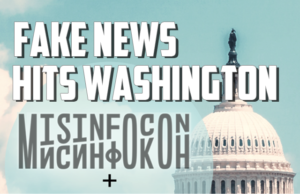
Source: Media Insider
Plans to help tackle so-called “fake news” have been announced by the BBC and some of the biggest names in journalism and technology. The new measures include an early warning system for use during elections or when lives may be at risk, extra online education and improved access to impartial resources for voters, the BBC reports:
Major publishers, Google, Twitter and Facebook have helped devise the scheme. It follows criticism of big technology firms for failing to do enough to prevent the spread of “false news” – from scares about vaccines to stories manufactured to influence elections.Earlier this summer, the BBC convened a Trusted News Summit, bringing together senior figures from major global technology firms and publishing to help tackle the problem. The group drew-up new plans including:
- Early warning system: creating a system so that organisations can alert each other rapidly when they discover disinformation that threatens human life or disrupts democracy during elections. The emphasis will be on moving quickly and collectively to undermine disinformation before it can take hold.
- Media education: a joint online media education campaign to support and promote media education messages.
- Voter information: co-operation on civic information around elections, so there is a common way to explain how and where to vote.
- Shared learning: particularly around high-profile elections.
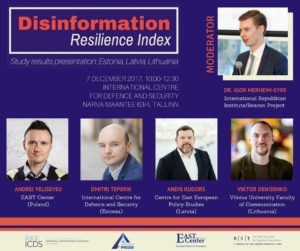 Democratic resilience lies in robust interaction between elections, fundamental rights and rule of law, a major conference hosted by the Finnish Presidency of the Council of the EU will hear this week.
Democratic resilience lies in robust interaction between elections, fundamental rights and rule of law, a major conference hosted by the Finnish Presidency of the Council of the EU will hear this week.
Technological advancement and innovations pose both opportunities and threats in the electoral process and in strengthening democracy. Voters increasingly get their information on the internet and from outside traditional media houses and print media, it notes:
Social media plays an ever-increasing role. Disinformation can hamper political debate and in the digital environment, especially on social media, it can spread and reach wide audiences quickly. It can also be targeted or used for malicious purposes. Disinformation can put democratic elections at jeopardy, not only by risking affecting the election outcome, but also by diminishing the trust in the democratic institutions.
How to address gaps in technical and policy understanding on emerging and urgent disinformation threats and responses, to better equip participants to address disinformation while preserving free expression and open discourse online?
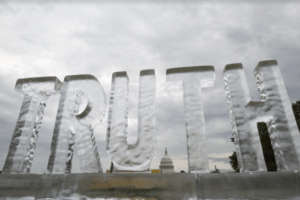
PEN America
That is only one of the questions to be addressed by PEN America, the Global Digital Policy Incubator at Stanford University’s Cyber Policy Center, and the Chair of the U.S. Federal Election Commission, Ellen L. Weintraub, at a half-day symposium to examine the urgent challenge that digital disinformation poses to our democracy, PEN America adds. As technological manipulation of information advances (identified in a recent RAND report) and disinformation becomes an increasingly common tactic in some campaign playbooks, the prospect that public trust in our democratic processes will further disintegrate looms large.
Confirmed participants include:
Senator Mark Warner (D-VA), vice-chair of the Senate Select Committee on Intelligence, and a leader of bipartisan efforts to U.S. elections from Russian and other malign foreign interference.
Hon. Michael Chertoff, Secretary of Homeland Security in the George W. Bush Administration (2005-2009), and Executive Chairman of the Chertoff Group.
Representative Stephanie Murphy (D-FL), a leader of bipartisan efforts in Congress to address the problem of “deep fakes” and to enhance transparency in efforts to unmask foreign interference in U.S. elections.
Suzanne Nossel, CEO of PEN America.
 Eileen Donahoe, Executive Director of the Global Digital Policy Incubator at Stanford University’s Cyber Policy Center (a National Endowment for Democracy board member).
Eileen Donahoe, Executive Director of the Global Digital Policy Incubator at Stanford University’s Cyber Policy Center (a National Endowment for Democracy board member).
Ginny Badanes, Director of strategic Projects for Microsoft’s Defending Democracy program.
Lisa Fazio, Vanderbilt University, an expert in how the brain processes fraudulent information, who will speak to the science behind this and how to mitigate the persuasive power of disinformation.
Camille Francois, Chief Innovation Officer at Graphika, where she works to detect and mitigate disinformation and media manipulation.
Katie Harbath, Facebook’s Public Policy Lead for Global elections.
Susan Ness, Annenberg Public Policy Center and leader of the Transatlantic High Level Working Group on Content Moderation Online and Freedom of Expression.
 Nathan Miller, Legal Director at Avaaz, which during the Spring 2019 campaigns for the European Parliament mobilized a network of researchers, investigative reporters and data analysts to monitor social media, identifying networks driving fraudulent news and pushing tech platforms to limit the damage being done.
Nathan Miller, Legal Director at Avaaz, which during the Spring 2019 campaigns for the European Parliament mobilized a network of researchers, investigative reporters and data analysts to monitor social media, identifying networks driving fraudulent news and pushing tech platforms to limit the damage being done.
Aimee Rinehart, Director of Development and Partnerships at First Draft, an organization working in Europe and the U.S. to support journalists, academics and technologists working to enhance trust and truth in the digital age.
Simon Rosenberg, President of NDN/New Policy Institute, during the 2018 campaign cycle he directed the countering disinformation initiative at the Democratic Congressional Campaign Committee.
Laura Rosenberger, Director of the Alliance for Securing Democracy, a bipartisan transatlantic national security advocacy group formed in July 2017 to counter efforts by Russia to undermine democratic institutions in the United States and Europe.
Clement Wolf, Google’s Global Public Policy Lead for Information Integrity.
Tuesday, September 17, 2019 | 8:30 am – 1:00 pm
Federal Elections Commission
Washington, D.C.1050 First Street, NE, Washington, D.C. 20463 https://www.fec.gov/







